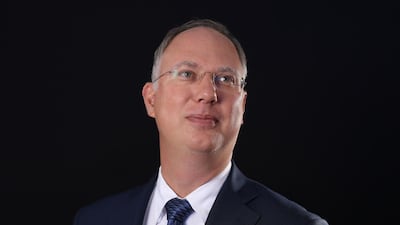The Russian Direct Investment Fund (RDIF) plans to invest in artificial intelligence and widen partnerships as it expects inflation to rise after central banks and governments rolled out trillions of dollars in stimulus packages and monetary easing measures to offset the impact of Covid-19.
"There is a risk of high inflation for sure given all of the money that has been printed," Kirill Dmitriev, the chief executive of the sovereign fund said in an interview with The National. "You see it in the US stock market, where it is basically [at the same level as] before Covid, even though Covid definitely has a very negative and significant impact on the economy. So, we do expect high inflation in the world going forward."
Two third of governments around the world have topped up their fiscal support to offset the effects of the pandemic on their economies, pumping about $11 trillion (Dh40.4tn) into their economies, compared with $8tn in April, according to the International Monetary Fund. That is in addition to monetary policy measures that amount to over $6tn.
The IMF projects the global economy will shrink 4.9 per cent this year with a sluggish recovery of 5.4 per cent in 2021. It estimates the cumulative loss to the global economy at of over $12tn over two years (2020-21) and 10 per cent of that stems from Latin America.
Gold, which is considered a hedge against inflation, has rallied to a record this month, touching $2,000 an ounce. On Thursday it retreated after a nine day rally but bullion is up about 29 per cent this year, as demand for the haven increased amid the economic downturn.
“We believe infrastructure and other assets that have some element of being protected against inflation are going to be useful [investments] going forward,” Mr Dmitriev said when asked about RDIF’s investment strategy amid the market volatility. “We continue to actively invest in technology; we continue to invest in infrastructure."
Assets will eventually increase in value because so much money has been printed around the world to fight Covid, he said.
"It’s important to own cash generating assets particularly if they are somehow protected against possibly growing inflation in the future,” Mr Dmitriev said
The Moscow-based RDIF has about $10 billion in assets under management and $40bn of commitments from its partners. The fund generally makes equity co-investments, primarily in Russia, alongside international financial and strategic investors, which include Mubadala Investment Company and Saudi Arabia’s Public Investment Fund.
“We have really a great partnership with Mubadala. Jointly with them we have done almost 50 investments in different companies; investments that produce good results and investments that help those companies grow,” Mr Dmitriev said.
The Mubadala-RDIF collaboration goes back to 2013 when the two companies formed a $7bn co-investment platform.
“This is a very key partnership for us and the level of partnership we have with the UAE is close to only maybe several other countries,” Mr Dmitriev said.
“We also have a number of investments that we are doing jointly with Saudi Arabia, Bahrain and Kuwait,” he added.
Forthcoming RDIF investments in technology could be outside of Russia and in partnership with sovereign wealth funds and other entities, Mr Dmitriev said.
“We feel that jointly we can make major breakthroughs including in artificial intelligence,” he said. “We believe the different areas of technology including artificial intelligence are very promising going forwarding.”
RDIF has partnered with China's e-commerce giant Alibaba, which has a venture in Russia. E-commerce sales in the country are projected to reach $21.6bn in 2020 and grow at an annual growth rate of 6.9 per cent (2020-2024), according to Statista data.
Given the current economic downturn RDIF will be very selective in how it invests its money, Mr Dmitriev said.
“We are a conservative investor and understand that the world economy will decline in many parts of the world, steeper than people think, [so] we are not rushing,” he said. “We want to make investments at the right time when we feel that our capital helps companies grow [and] recover from some of the difficulties they faced in the coronavirus times.”


